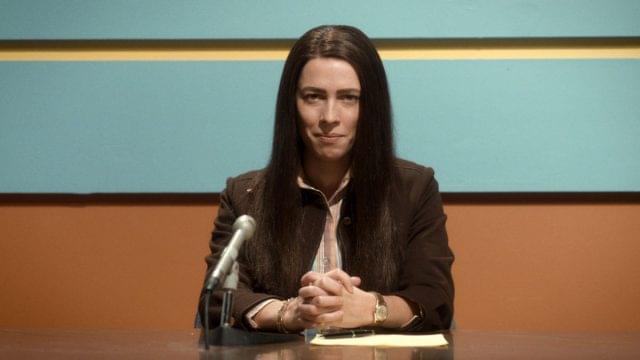
If you know the name Christine Chubbuck, you also know how her story turned out, as she’s one of those unfortunate souls who were only made famous by tragedy. To make a film about such a person is tricky. If the only notable thing about her was a single event, won’t the movie seem like it’s spinning its wheels waiting for that moment to arrive?
The film about Chubbuck, simply titled “Christine,” avoids that trap by making her a compelling character in her own right. Played with raw sympathy by Rebecca Hall, Christine is an ambitious Florida TV news reporter who’s undone by her inability to cope with life’s frustrations. Even if you know how it’s going to end, the film is engrossing — not least because, in the interest of avoiding another biopic trap, the filmmakers are more concerned about telling a good story than they are about recreating the details with perfect accuracy.
Here’s an example of what I mean. In real life, Chubbuck’s mom and one of her two brothers were living with her during the time in question. In the film, there are no brothers. Why? You’d have to ask screenwriter Craig Shilowich, but I’m guessing it’s because his vision of the cleanest, most efficient way of telling the story simply didn’t require a brother character. The timing of Chubbuck’s health scare, her history with psychiatrists, and the details of her last day on the job are also smoothed out and rearranged for purposes of effective storytelling. None of these changes affect the outcome; they just make it a better story.
Why, this biopic doesn’t even end with photos of the real Christine Chubbuck, or with words on the screen to tell us what happened next! It’s as if it’s not a slavishly faithful retelling of a historical event at all, but a … a movie.
It’s the summer of 1974. Everyone’s talking about Watergate and impeachment proceedings, and “Christine” opens with the title character practicing her interview skills in case she should ever get a one-on-one with Nixon. (Spoiler: she doesn’t.) A field reporter for a small TV station in Sarasota, Christine is single, almost 30, romantically forlorn, and eager to prove herself as a journalist. She hosts a community affairs show and wants to cover substantive issues: “People are listening to me, so I need to make sure that I’m really saying something.” But the news director, Michael (Tracy Letts), wants juicier stories to boost ratings, “ratings” being a fairly new factor for TV news to consider. So Christine starts listening to the police scanner in search of something sensational.
Meanwhile, she has a crush on the news anchor, George Ryan (Michael C. Hall), and is oblivious to the weatherman’s (Timothy Simons) kindnesses toward her. An awkward encounter with a romantic couple at a restaurant shows how painful Christine’s yearning is, and how not-quite-right she is, emotionally speaking. Her mother (J. Smith-Cameron), who lives with her and has a more active romantic life than she does, worries about Christine’s “moods,” which we understand have been a problem in the past.
As Christine becomes more desperate, professionally and personally, her behavior becomes more troubling. Director Antonio Campos dealt with unstable protagonists in “Afterschool” and “Simon Killer,” so he’s well-versed in hinting at a person’s inner turmoil without overdoing it. But “Christine,” a true story that demands a realistic touch, is still something of a departure for Campos, and he scored by casting the undervalued Rebecca Hall in the lead. She plays Christine as someone who’s smart as a journalist but naive as a woman, unaware of what she’s unaware of. In other hands, this might have been “oh, let’s watch the crazy lady fall apart.” Instead, it’s a sensitive, compelling character study with an ominous undercurrent.
B+ (1 hr., 55 min.; )





